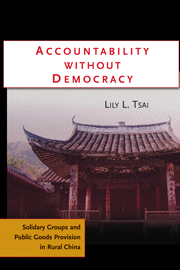Book contents
- Frontmatter
- Contents
- List of Figures
- List of Tables
- Acknowledgments
- 1 GOVERNANCE AND INFORMAL INSTITUTIONS OF ACCOUNTABILITY
- 2 DECENTRALIZATION AND LOCAL GOVERNMENTAL PERFORMANCE
- 3 LOCAL GOVERNMENTAL PERFORMANCE
- 4 INFORMAL ACCOUNTABILITY AND THE STRUCTURE OF SOLIDARY GROUPS
- 5 TEMPLES AND CHURCHES IN RURAL CHINA
- 6 LINEAGES AND LOCAL GOVERNANCE
- 7 ACCOUNTABILITY AND VILLAGE DEMOCRATIC REFORMS
- 8 THE LIMITATIONS OF FORMAL PARTY AND BUREAUCRATIC INSTITUTIONS
- 9 CONCLUSION
- References
- Appendix: Additional Notes on Survey Sampling and Data Analysis
- Index
- Cambridge Studies in Comparative Politics
Appendix: Additional Notes on Survey Sampling and Data Analysis
Published online by Cambridge University Press: 05 June 2012
- Frontmatter
- Contents
- List of Figures
- List of Tables
- Acknowledgments
- 1 GOVERNANCE AND INFORMAL INSTITUTIONS OF ACCOUNTABILITY
- 2 DECENTRALIZATION AND LOCAL GOVERNMENTAL PERFORMANCE
- 3 LOCAL GOVERNMENTAL PERFORMANCE
- 4 INFORMAL ACCOUNTABILITY AND THE STRUCTURE OF SOLIDARY GROUPS
- 5 TEMPLES AND CHURCHES IN RURAL CHINA
- 6 LINEAGES AND LOCAL GOVERNANCE
- 7 ACCOUNTABILITY AND VILLAGE DEMOCRATIC REFORMS
- 8 THE LIMITATIONS OF FORMAL PARTY AND BUREAUCRATIC INSTITUTIONS
- 9 CONCLUSION
- References
- Appendix: Additional Notes on Survey Sampling and Data Analysis
- Index
- Cambridge Studies in Comparative Politics
Summary
In 2001, I conducted a village-level survey of 316 villages sampled from four provinces: Shanxi, Hebei, Jiangxi, and Fujian. With a team of ten to fifteen Chinese graduate and undergraduate students in each province, the survey took about seven weeks to administer. The selection of these provinces was based both on my network of contacts and on the objective of obtaining a sample that would be roughly representative of the general population. These four provinces varied along two important macro-level dimensions. First, coastal and inland regions differ significantly from each other in terms of economic development and liberalization. Second, north and south China vary greatly in their institutional history and social organization. Shanxi and Hebei provinces in north China are relatively flat and dry, whereas Jiangxi and Fujian provinces in south China are mountainous and humid. Lineage and religious institutions in the north are generally less formalized than in south China. Villages in the north tend to be organized as a single centralized geographical cluster rather than fragmented into numerous settlements, as they often are in the south due to the terrain. Within each pair, one province was coastal and one was inland. Between the two northern provinces, Hebei, which is closer to the coast, has industrialized and developed its infrastructure more than Shanxi has. In the southern provinces, Fujian is on the coast and known for its liberal and successful pursuit of economic and political reforms, whereas Jiangxi is a politically conservative interior province that lags behind Fujian in economic development.
- Type
- Chapter
- Information
- Accountability without DemocracySolidary Groups and Public Goods Provision in Rural China, pp. 287 - 340Publisher: Cambridge University PressPrint publication year: 2007



